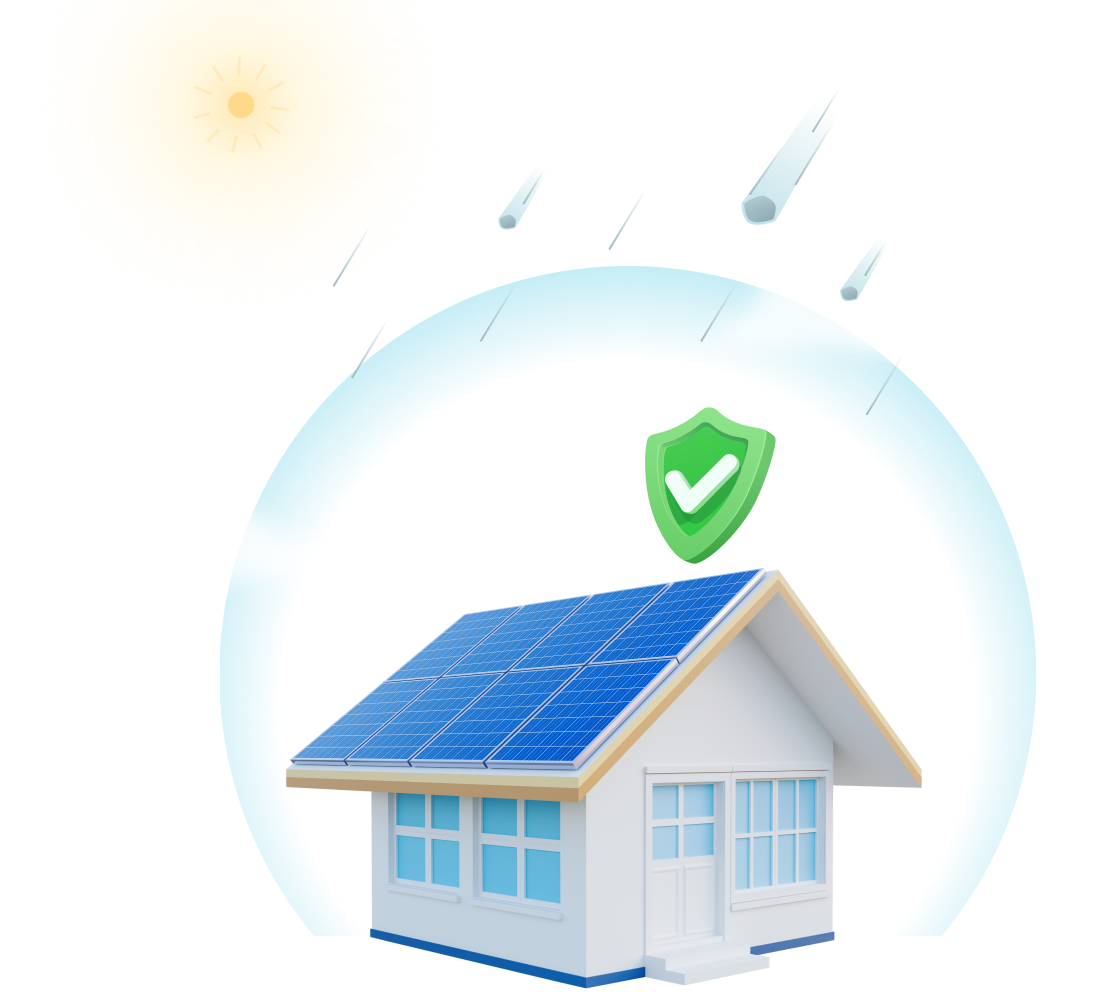What is Solar Panel Insurance?
A solar panel insurance policy is a tailored policy designed for homeowners who own solar power plants on their rooftops. This policy typically covers loss, damage, liability, and optional risks associated with the installed solar panels.
Solar panel insurance offers financial protection against various insured perils impacting your installed rooftop solar system. It helps you cover repair or replacement costs if your panels are damaged due to:

Why Homeowners Need Solar Panel Insurance?
Since the solar panel is a valuable asset and a 3kW to 5kW residential set-up cost can range between ₹1.5 – ₹3 lakh, it becomes essential to get solar panel insurance. Any damage to such a high-value set-up will lead to huge repair bills or even total system loss. With rising climate-related events and theft, having solar panel insurance is essential.
While standalone solar panel insurance exists, smart homeowners today choose comprehensive home insurance policies that cover the home and solar panel set-up as its content or structure under a single plan.

What Does Solar Panel Insurance Cover?
- Core coverage
- Optional add-on covers
What is Not Covered Under Solar Panel Insurance for Homeowners?
- Damage from terrorism (separately covered in an add-on).
- Damage due to regular wear & tear, ageing, and rust.
- Damage due to improper use, negligence, or consequential loss.
- Theft of only cables.
- Loss due to defects known but not disclosed.
- Damage to the outer surface damages its aesthetics, like scratches.

Solar Panel Insurance: Standalone vs. Home Insurance Bundle Policy
Benefits of Solar Panel Insurance with Home Insurance Policy
As rooftop solar panels become increasingly common in Indian households, many homeowners wonder, "Do I need a separate insurance policy for my solar panels?"
Not always, especially if you have the right home insurance policy
In many home insurance policies, solar panels are treated as part of the building if they are permanently fixed to the rooftop or declared when you buy or renew home insurance policy.
More, these homeowner insurance policies often define the "building" to include fixtures and additional structures such as water tanks, rooftop fittings, parking spaces, solar panel systems, etc.
If your solar panels meet the above criteria and are properly declared:
You do not need separate or standalone solar insurance.
Your panels are protected under the same terms as your home, including risks like fire, storm, theft, lightning, and accidental damage.

-
Enjoy comprehensive protection that is not just limited to your solar panels but includes your entire home and its contents.
-
This is a cost-effective option as a single premium will be paid for it.
-
The claim process becomes faster and simpler as there is no juggling between two insurers for a single damage event.
-
Get a choice of add-ons to cover various other perils not covered in the base policy.
-
No juggling between two insurers for a single damage event.
-
Add-ons like public liability or electrical breakdown can be easily included.
- Disclose your solar panel setup while buying home insurance
Always inform your insurer about your solar panel installation when purchasing or renewing your home insurance policy. This ensures your solar panels are included under the building cover and prevents claim rejection if any damage occurs later. - Confirm how solar panels are covered in the policy
Most insurers cover roof-mounted and permanently fixed solar panels as part of the home’s structure. However, if your panels are ground-mounted or portable, you may need separate solar panel insurance or an add-on under your home insurance plan. - Check the coverage and exclusions
Review the risks your policy protects against — such as fire, storms, theft, and accidental damage. Many home insurance for solar panels policies exclude wear and tear, manufacturing faults, or damage caused by poor installation, so it’s important to read the fine print carefully. - Include all connected equipment
Don’t forget to ask if components like inverters, batteries, and meters are covered. These are high-value items and may require additional protection under solar panel insurance coverage. - Maintain records and regular upkeep
Keep installation documents, invoices, and recent photographs of your solar panels. Regular maintenance and proper installation not only improve efficiency but also help with smooth claim processing in case of damage.
How to File a Claim for Solar Panel Insurance Under Home Insurance Policy?
If your rooftop solar panel is damaged due to any unforeseen risks mentioned in the policy documents, you can raise a claim by following the below steps:
-
Inform the insurance provider immediately after the incident via their claim helpline number.
-
Take the video and photos of the damaged solar panels or related equipment. Do not try to remove or alter the damaged components unless necessary for safety.
-
Download and submit a written claim form available at the insurer’s website.
-
Provide the necessary details asked, such as cause of damage, estimated loss amount, and proof of ownership of solar panel system (bills & installation certificates).
-
Keep all the necessary documents ready, such as:
-
The insurer will assign a surveyor to inspect the damage. In minor claims, this may be a remote video inspection; major claims may require a physical visit. Cooperate fully and provide any additional documents the surveyor asks for.
-
Once verified, the insurer will process the claim amount, and settlement is typically done via NEFT by reimbursing your registered bank account.

Tips to Keep in Mind While Filing Solar Panel Insurance

Who should buy Solar Panel Insurance?
Here is a list of individuals who should opt for this policy:
FAQs – Solar Panel Insurance
-
Q. Is there any insurance on solar panels?
Ans: Yes, solar panels can be insured under home insurance if they’re roof-mounted and fixed or via a standalone solar panel policy. -
Q. What is the 20% rule for solar panels?
Ans: It refers to a general rule that solar panels shouldn’t exceed 20% of the roof area in certain housing societies or regulations, and it is often used in permits or structural load limits. -
Q. Do I need a separate policy for my rooftop solar panels?
Ans: Not always. If panels are permanently fixed to your roof, they can be covered under a home insurance policy offered at Policybazaar.com. Hence, you do not have a separate or standalone policy to cover it. -
Q. Are solar panels covered under home insurance by default?
Ans: They are covered only if declared and permanently fixed to the building structure. -
Q. What kind of damages are covered by solar panels insurance?
Ans: Usually, it covers the damages or losses incurred due to fire, storm, theft, lightning, and falling objects. -
Q. Will my claim be rejected if I didn’t declare the solar panels?
Ans: Yes, if the solar panel is disclosed, this may lead to claim rejection. Therefore, always inform your insurer when you install them.








